
Events - ENERGIES Dialogue
A year-long conversation about energies—personal, collective, planetary—from different humanistic perspectives
We live in a time of energy dilemmas. Personal energies feel depleted in the wake of the pandemic, collective energies seem necessary in this political moment, and climate change demands new approaches to energy resources. The Kaplan ENERGIES Dialogue brings to the fore key humanistic concerns with ethics, imagination, power, and contingency to understand these energy dilemmas, including their roots and past resonances. The Dialogue also seeks to highlight and explore more energetically sustainable modes of worldmaking.
KEYNOTES
Spring 2023
A Conversation about Liberation, Beauty, and Energies in Art Making
Torkwase Dyson with D. Soyini Madison
May 10, 2023
6:00 - 7:30 pm
Block Museum of Art (40 Arts Circle Drive)
Tickets: bit.ly/3ImaTbS
Tickets are free for this event; public welcome! RSVPs are not required, but appreciated, as they help us anticipate attendance numbers.
Co-presented with the Block Museum of Art.
As so many living species lose their lives as well as gain new life due to the complex, contradictory, multiple forces and forms of energy—too much or too little energy—we ask, What does art have to do with the urgences of energy? How can art matter when bodies, in all living forms, are on the line because of the scarcity or abundance of energy? and, finally, Where is energy located, or made relevant, in abstract art and in beauty? We will begin to open these questions through a discussion of “art making” with its processes and intentions for more “livable geographies.” Art lives alongside notions of beauty, making representation and the intermix of energy and beauty compelling work for the artist, especially if that artist is ‘energized’ in their work by creating work that is liberatory.
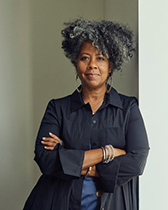 Torkwase Dyson works in painting, drawing, and sculpture. Dyson combines expressive mark-making and geometric abstraction to explore the continuity between ecology, infrastructure, and architecture. Dyson deconstructs, distills, and interrogates the built environment, exploring how individuals—particularly Black and Brown people—negotiate, negate, and transform systems and spatial order. With an emphasis on the ways black and brown bodies perceive and negotiate space as information, Dyson looks to spatial liberation strategies from historical and contemporary perspectives, seeking to uncover new understandings of the potential for more livable geographies. Torkwase Dyson employs abstract shapes and forms as a means of exploring the intersections of environmental liberation, movement, and architecture. Within her practice, she has developed a unique vocabulary of abstract lines, forms, shapes, and edges informed by her theory of Black Compositional Thought. This term considers how waterways, objects, and geographies are composed and inhabited by black bodies, and how the properties of energy, space, and scale can form networks of liberation.
Torkwase Dyson works in painting, drawing, and sculpture. Dyson combines expressive mark-making and geometric abstraction to explore the continuity between ecology, infrastructure, and architecture. Dyson deconstructs, distills, and interrogates the built environment, exploring how individuals—particularly Black and Brown people—negotiate, negate, and transform systems and spatial order. With an emphasis on the ways black and brown bodies perceive and negotiate space as information, Dyson looks to spatial liberation strategies from historical and contemporary perspectives, seeking to uncover new understandings of the potential for more livable geographies. Torkwase Dyson employs abstract shapes and forms as a means of exploring the intersections of environmental liberation, movement, and architecture. Within her practice, she has developed a unique vocabulary of abstract lines, forms, shapes, and edges informed by her theory of Black Compositional Thought. This term considers how waterways, objects, and geographies are composed and inhabited by black bodies, and how the properties of energy, space, and scale can form networks of liberation.
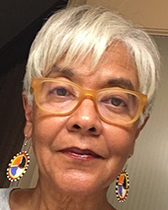 D. Soyini Madison is professor emeritus in the Department of Performance Studies at Northwestern. Madison focuses on the artistry and poetics of fieldwork methods as embodied in ethnographic techniques and practices. Her publications and staged performances engage the intersections of labor activism, political economy of human rights, water democracy, and indigenous performance tactics. Madison’s recent books include Critical Ethnography: Method, Ethics, and Performance (3rd edition) and PerformED Ethnography and Communication: Improvisation and Embodied Experience. Her performed ethnographies include: “Is it a Human Being or a Girl?,” “Water Rites,” and “Labor Rites.” Her most recent performance work, “Seahorse and Bellymouth,” takes a turn into the allegorical when the ocean life of a Seahorse must overcome the gluttonous appetite of the monster known as BellyMouth.
D. Soyini Madison is professor emeritus in the Department of Performance Studies at Northwestern. Madison focuses on the artistry and poetics of fieldwork methods as embodied in ethnographic techniques and practices. Her publications and staged performances engage the intersections of labor activism, political economy of human rights, water democracy, and indigenous performance tactics. Madison’s recent books include Critical Ethnography: Method, Ethics, and Performance (3rd edition) and PerformED Ethnography and Communication: Improvisation and Embodied Experience. Her performed ethnographies include: “Is it a Human Being or a Girl?,” “Water Rites,” and “Labor Rites.” Her most recent performance work, “Seahorse and Bellymouth,” takes a turn into the allegorical when the ocean life of a Seahorse must overcome the gluttonous appetite of the monster known as BellyMouth.
Fall 2022
Academic Energies: A Conversation Beyond Coping
Tina Chen with Nitasha Tamar Sharma
October 25, 2022
5:00 - 6:30 pm
Harris Hall, Room 108
As we begin a new school year three years into a global pandemic and worldwide turmoil, how might we move in, through, and beyond academic cynicism and exhaustion? How can we rethink academic energies to reach a more sustainable and capacious notion of scholarly work alongside a life well lived? How have faculty revisited the question of “work-life balance”? This conversation between Tina Chen and Nitasha Tamar Sharma will address these questions with a particular focus on academic labor, the gender and racial dynamics of service and family care, and the challenging structures of colleges and universities today. We hope this conversation joins discussions that others in and out of the academy are having about the possibilities of a changing university and new approaches to the oft-competing priorities that shape our lives.
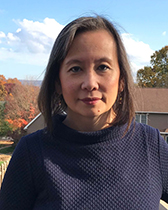 Tina Chen is Associate Professor of English and Asian American Studies at Penn State University where she is also Director of the Global Asias Initiative. She is the Founding Editor of Verge: Studies in Global Asias. She is the mother of a college freshman, someone who lives with breast cancer, and a scholar-teacher committed to developing platforms that encourage multidisciplinary engagement and the cross-pollination of knowledge across disciplinary and field boundaries. She is currently working on Alien Forms: Global Asias and the Speculative Genres of Academic Labor, a monograph that questions the ways in which academic labor has been parsed into the categories of “research, teaching, and service” and argues for a more expansive notion of scholarly work.
Tina Chen is Associate Professor of English and Asian American Studies at Penn State University where she is also Director of the Global Asias Initiative. She is the Founding Editor of Verge: Studies in Global Asias. She is the mother of a college freshman, someone who lives with breast cancer, and a scholar-teacher committed to developing platforms that encourage multidisciplinary engagement and the cross-pollination of knowledge across disciplinary and field boundaries. She is currently working on Alien Forms: Global Asias and the Speculative Genres of Academic Labor, a monograph that questions the ways in which academic labor has been parsed into the categories of “research, teaching, and service” and argues for a more expansive notion of scholarly work. 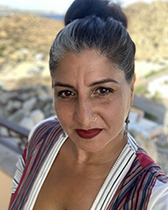 Nitasha Tamar Sharma is the mother of two young children and a professor of African American Studies and Asian American Studies at Northwestern. She is the author or co-editor of four books and is an Associate Editor of American Quarterly. At Northwestern, Nitasha is the director of the Asian American Studies Program and co-director of the Council for Race and Ethnic Studies.
Nitasha Tamar Sharma is the mother of two young children and a professor of African American Studies and Asian American Studies at Northwestern. She is the author or co-editor of four books and is an Associate Editor of American Quarterly. At Northwestern, Nitasha is the director of the Asian American Studies Program and co-director of the Council for Race and Ethnic Studies.
Co-sponsored ENERGIES events
ENERGIES of LIBERATION
Speaker series in Radio/TV/Film 398 course "Film, Media, and Liberation Movements" taught by Dr. Michael Anthony Turcios, Winter quarter 2023
- Recipient of a course enhancement grant from the Kaplan Humanities Institute for the ENERGIES Dialogue series
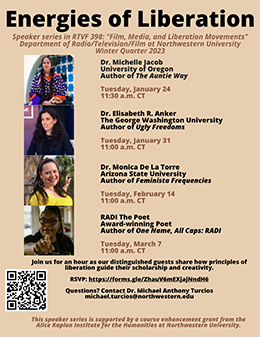 Guests are invited to join this class for an hour to hear distinguished guests share how principles of liberation guide their scholarship and creativity.
Guests are invited to join this class for an hour to hear distinguished guests share how principles of liberation guide their scholarship and creativity.RSVP
Guests are asked to RSVP for the dates that interest them, and to indicate whether they are interested for in-person or virtual attendance. Details will then be sent closer to the date of each event.
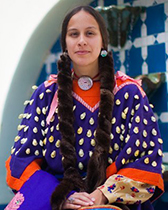 Dr. Michelle Jacob
Dr. Michelle Jacob
University of Oregon
Author of The Auntie Way
Tuesday, January 24
11:30 am CT
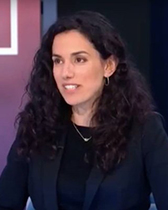 Dr. Elisabeth R. Anker
Dr. Elisabeth R. Anker
The George Washington University
Author of Ugly Freedoms
Tuesday, January 31
11:00 am CT
 Dr. Monica De La Torre
Dr. Monica De La Torre
Arizona State University
Author of Feminista Frequencies
Tuesday, February 14
11:00 am CT
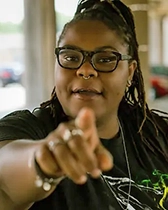 RADI the Poet
RADI the Poet
Award-winning poet
Author of One Name, All Caps: RADI
Tuesday, March 7
11:00 am CT
Crude Aesthetics: Oil on Film - film series
Winter quarter 2023
Co-presented with Block Cinema, the Climate Crisis and Media Arts Working Group, the Department of English, the Environmental Humanities Working Group, the Comparative Literary Studies program, the Department of Radio, Television, and Film, the Department of Spanish & Portuguese, the Department of French & Italian, the Middle East and North African Studies program, the School of Communications Humanities Council, the Environmental Policy & Culture Program, and the Screen Cultures program at Northwestern.
Across a feast of genres, including melodrama, comedy, thriller, and documentary, the films of Crude Aesthetics: Oil on Film reveal the entanglement of visual culture with the dark progress of the global oil industry during the past century. The predatory optimism of oil has left a powerful, contradictory, and sometimes vanishingly subtle record in the history of cinema. Crude Aesthetics brings together screenings, talks, and discussions to explore the ways film media of the past century have shaped how we see — or learn not to see — the fuller impacts of our fatalistic dependence on oil.
All screenings at Block Cinema, 40 Arts Circle Drive, Evanston.
Link to descriptions of all films: https://www.blockmuseum.northwestern.edu/cinema/crude-aesthetics-oil-on-film.html
Rosa Blanca (Bavaldón 1961)
January 26, 2023 — 7:00 pm
Intro by Carolyn Fornoff, Latin American Studies (Cornell)
Local Hero (Forsyth 1983)
February 2, 2023— 7:00 pm
Intro by Tristram Wolff, English (Northwestern)
Dry Ground Burning (Pimenta and Queirós 2022)
February 24, 2023—6:00 pm
With filmmaker Joana Pimenta
Giuseppina + The Umbrellas of Cherbourg (Hill 1959 + Demy 1964)
March 2, 2023—6:30pm
Intro by Brian Jacobson, Visual Culture (CalTech)
Oil at the Movies — Featured Roundtable focused on oil-company sponsored films
March 3, 2023
1:00 - 3:00 pm
Louis Hall 119
A Fire + One Image, Two Acts (Golestan 1961 + Sohrabi 2020)
March 3, 2023—7:00 pm
Intro by Mona Damluji, Film and Media Studies (UCSB); with filmmaker Sanaz Sohrabi
Tracing the Decolonial Turn in Data Research: Notes on Intersecting Energy Cultures and Environmental Media
Rahul Mukherjee
March 2, 2023
5:15 pm
Kaplan Institute, Kresge #2351
Presented by The Subcontinent Project (TSP), a graduate student organization at Northwestern facilitating critical conversations about South Asian politics, culture, and society. TSP organizes academic events, social events, and engagements with the university administration around the topic of South Asia.
“‘Global’ Big Tech social media companies, fintech corporations, and video-on-demand streaming services are criticized for being data accumulators and aggregators, and for implementing a regime of ‘data colonialism’ based primarily on data extraction as a new kind of capitalistic resource extraction. The decolonial turn in data research asks for nuancing the ‘data colonialism’ thesis by asking critical data studies scholars and activists to think beyond ‘datafication as resource extraction’ to questions about epistemic and ontological (in)justices, and the need for epistemological re-positionings (Mumford, 2022). Even as ‘Big Tech’ social media companies are criticized by particular national(ist) ruling regimes for their data extraction practices, the government supported ‘national’ social media and telecom companies are not engaging in decolonial practices themselves given their participation in global networked capitalism(s).
"In this talk, I discuss how debates about location of data centers in particular countries is imbricated in debates about data colonialism and intersecting energy cultures. With vehement critiques of data colonialism in India, there is increasing demand for data centers to be housed within India if they are storing data about Indian citizens. Data centers are energy guzzlers, and with rapidly depleting coal and oil reserves and concerns about climate change, data center companies are increasingly asked to embrace post-carbon energy futures. This moment of energy transition to wind and solar, and (even ‘nuclear’) and geothermal energies has been contentious, and while there is genuine hope in renewable energies, there are also fears of ‘green capitalism’ creating resource frontiers that can(/are) not only be extractive but also devalue local knowledge systems and ways of living. Thinking through entangled questions of energy justice and environmental media, this talk focuses on the data-energy relations as another approach to reimagine practices of data storing and processing in the ‘Global South.’”
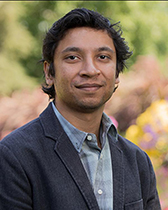 Rahul Mukherjee is an Associate Professor of English, and of Television and New Media Studies at the University of Pennsylvania. He is author of Radiant Infrastructures: Media, Environment, and Cultures of Uncertainty (2020), which studies how radiation as a form of energy and infrastructure creates “environmental publics” which articulate contesting views about the relationship between modernity, wireless signals, and nuclear power.
Rahul Mukherjee is an Associate Professor of English, and of Television and New Media Studies at the University of Pennsylvania. He is author of Radiant Infrastructures: Media, Environment, and Cultures of Uncertainty (2020), which studies how radiation as a form of energy and infrastructure creates “environmental publics” which articulate contesting views about the relationship between modernity, wireless signals, and nuclear power.

Dario Robleto, film still from "The Boundary of Life is Quietly Crossed," 2019. Image courtesy of Dario Robleto.
Ann Druyan, The Golden Record, and the Memory of Our Hearts
Exhibit Conversation (online)
March 8, 2023
6:00- 7:30 pm CT
Via Zoom (registration required): https://northwestern.zoom.us/webinar/register/WN_Jg_3ZSmJSLylqWHf25nhsg%20
Co-presented by the Block Museum of Art, which acknowledges support from the Illinois Arts Council Agency.
What do we owe to the memory of each other’s hearts? From her work in the 1970s as the Creative Director for NASA’s Voyager Interstellar Messaging Project to her current role as writer and producer of the beloved television series Cosmos, Ann Druyan has devoted her life to expanding the horizons of human empathy and communication. In insisting that the thresholds of cosmic exploration must be approached with sincerity, humility, and generosity, she has had a deep influence on Dario Robleto’s work throughout his career. Druyan and Robleto will be joined in conversation with The Heart’s Knowledge catalogue contributor Jennifer Roberts, Professor of the Humanities at Harvard, who is co-authoring a book with Robleto about the interstellar journey of the pulse wave recordings that Druyan included on the Voyager Golden Record.
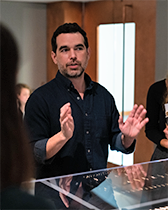 Dario Robleto was born in San Antonio, Texas in 1972 and received his BFA from the University of Texas at San Antonio in 1997. He lives and works in Houston, TX.
Dario Robleto was born in San Antonio, Texas in 1972 and received his BFA from the University of Texas at San Antonio in 1997. He lives and works in Houston, TX.
The artist has had numerous solo exhibitions since 1997, most recently at the Spencer Museum of Art, Lawrence, KS (2021); the Radcliffe Institute for Advanced Study at Harvard University (2019); the McNay Museum, San Antonio, TX (2018); Menil Collection, Houston, TX (2014); the Baltimore Museum of Art (2014); the New Orleans Museum of Art (2012); and the Museum of Contemporary Art, Denver (2011). His work has been profiled in numerous publications and media including Radiolab, Krista Tippet's On Being, and the New York Times. In 2008 a 10-year survey exhibition, Alloy of Love, was organized by the Frances Young Tang Teaching Museum and Art Gallery at Skidmore College, Saratoga Springs, New York. Accompanied by a major monograph, Alloy of Love traveled to the Frye Art Museum in Seattle, Washington.
Robleto's full bio
 Ann Druyan is a Peabody and Emmy Award-winning writer, producer and director specializing in the communication of science. Druyan served for 10 years as the elected Secretary of the Federation of American Scientists and began her writing career with the publication of her first novel, “A Famous Broken Heart.” She was the Creative Director of NASA’s Voyager Interstellar Message Project and Program Director of the first solar sail deep space mission, launched on a Russian ICBM in 2005.
Ann Druyan is a Peabody and Emmy Award-winning writer, producer and director specializing in the communication of science. Druyan served for 10 years as the elected Secretary of the Federation of American Scientists and began her writing career with the publication of her first novel, “A Famous Broken Heart.” She was the Creative Director of NASA’s Voyager Interstellar Message Project and Program Director of the first solar sail deep space mission, launched on a Russian ICBM in 2005.
She wrote with her late husband, Carl Sagan, the original 1980s Emmy Award- and Peabody Award-winning TV series “COSMOS: A Personal Voyage.” It is currently the most watched PBS series in global television history. As Founder and CEO of Cosmos Studios, since 2000, Druyan has built on the success of the original “COSMOS” television series and produced some of the most acclaimed science-based entertainment, including "COSMOS: A SpaceTime Odyssey” and "COSMOS: Possible Worlds," which premiered March 2020.
Ms. Druyan served as Creative Director of the NASA Voyager Interstellar Record Project to design a complex message, including music and images, for possible alien civilizations. These golden phonograph records affixed to the Voyager 1 and 2 spacecraft, the fastest moving vehicles ever created by the human species, are now the most distant objects ever touched by human hands. They have crossed the heliopause, that place far beyond the outermost planets of the solar system where the solar wind gives way to the interstellar medium. They have a projected shelf life of one to five billion years and are expected to make several circumnavigations of the Milky Way Galaxy.
Ann Druyan photo by Bryan Bedder/Getty Images Entertainment via Getty Images.
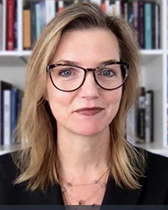 Jennifer L. Roberts is Elizabeth Cary Agassiz Professor of the Humanities at Harvard University, where she teaches art history and material culture with an emphasis on the interface between the arts and the natural sciences. She is the author of numerous books and essays on American art and science from the eighteenth century to the present, and has also curated exhibitions in modern and contemporary art at the Harvard Art Museums and the Harvard Radcliffe Institute. In spring of 2021, she delivered the 70th Annual A.W. Mellon Lectures in the Fine Arts for the National Gallery of Art, with a series titled Contact: Art and the Pull of Print. She is currently focusing on initiatives to create alliances between the humanities and the STEM fields at Harvard and beyond, and is co-authoring a book with Robleto titled Life Signs: The Tender Science of the Pulsewave.
Jennifer L. Roberts is Elizabeth Cary Agassiz Professor of the Humanities at Harvard University, where she teaches art history and material culture with an emphasis on the interface between the arts and the natural sciences. She is the author of numerous books and essays on American art and science from the eighteenth century to the present, and has also curated exhibitions in modern and contemporary art at the Harvard Art Museums and the Harvard Radcliffe Institute. In spring of 2021, she delivered the 70th Annual A.W. Mellon Lectures in the Fine Arts for the National Gallery of Art, with a series titled Contact: Art and the Pull of Print. She is currently focusing on initiatives to create alliances between the humanities and the STEM fields at Harvard and beyond, and is co-authoring a book with Robleto titled Life Signs: The Tender Science of the Pulsewave.
International Feminist Peace Activism in Korea: Film Screening and Speaker Panels
April 21, 2023
A screening of the film Crossings (2021) and panels with the film's director, featured activist, and scholars. More event details at: https://asianamerican.northwestern.edu/about/events/crossings.html
Part 1: Film Screening
Harris Hall Room 107, 1881 Sheridan Rd, Evanston
- 2 PM - 3:40 PM Film Screening (94 min. run time)
Part 2: Panels & Reception
Harris Hall Room 108, 1881 Sheridan Rd, Evanston
- 3:50 PM - 4:30 PM Panel 1 with Director Deann Borshay Liem and Activist Christine Ahn
- 4:40 PM - 5:30 PM Panel 2 with scholars Suzy Kim and Daniel Kim
- 5:30 PM - 6:20 PM Reception with light refreshments
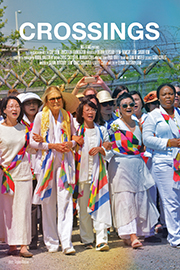 Crossings (2021), directed by Deann Borshay Liem, documents the peace activism of Women Cross DMZ, a group of international women peacemakers who walk across the demilitarized zone between North and South Korea to forge a path toward peace and reconciliation. Join us for the film screening and accompanying panels with the film director, featured activist, and scholars for a discussion on international feminist peace activism, Korea's history, and issues of militarism.
Crossings (2021), directed by Deann Borshay Liem, documents the peace activism of Women Cross DMZ, a group of international women peacemakers who walk across the demilitarized zone between North and South Korea to forge a path toward peace and reconciliation. Join us for the film screening and accompanying panels with the film director, featured activist, and scholars for a discussion on international feminist peace activism, Korea's history, and issues of militarism.
International feminist peace organizing efforts are a form of energy generated by the longer efforts to bring peace to the Korean peninsula. This event will address how the organizing efforts intersect with the artistic and scholarly energies surrounding Women Cross DMZ and Korean American organizers who have worked hard to sustain a lively and engaged community of diasporic organizers. How do we approach and recreate the energies of past direct actions towards future ones to end militarization and war in the region? Given militarism’s global environmental toll as one of the largest polluters, and the complex eco-system that has developed in the DMZ, how might we consider direct actions of Women Cross DMZ as a conservational effort towards a greener future?
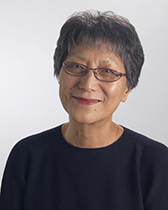 Deann Borshay Liem is a documentary film director and producer with over twenty years’ experience. She is Producer, Director, and Writer of the Emmy Award-nominated documentary, First Person Plural (Sundance, 2000).
Deann Borshay Liem is a documentary film director and producer with over twenty years’ experience. She is Producer, Director, and Writer of the Emmy Award-nominated documentary, First Person Plural (Sundance, 2000).
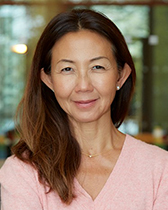 Christine Ahn is the Founder and Executive Director of Women Cross DMZ, a global movement of women mobilizing to end the Korean War and ensure women’s leadership in peace building.
Christine Ahn is the Founder and Executive Director of Women Cross DMZ, a global movement of women mobilizing to end the Korean War and ensure women’s leadership in peace building.
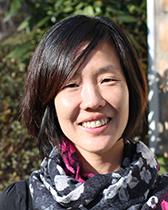 Suzy Kim is Associate Professor of Korean History at Rutgers University, New Brunswick and the author of Everyday Life in the North Korean Revolution, 1945-1950 (Cornell University Press, 2013).
Suzy Kim is Associate Professor of Korean History at Rutgers University, New Brunswick and the author of Everyday Life in the North Korean Revolution, 1945-1950 (Cornell University Press, 2013).
 Daniel Kim is Associate Professor of English and American Studies at Brown University and the author of The Intimacies of Conflict: A Cultural History of the Korean War (NYU Press, 2020).
Daniel Kim is Associate Professor of English and American Studies at Brown University and the author of The Intimacies of Conflict: A Cultural History of the Korean War (NYU Press, 2020).
Descendant—Film screening and related talks
With director Margaret Brown and co-producer and writer Professor Kern Jackson of University of Southern Alabama
April 27, 2023
Film screening and talkback
5:00 - 8:00 pm
Block Museum of Art, 40 Arts Circle Drive
April 28, 2023
Lunchtime talks by Margaret Brown and Kern Jackson
Co-sponsored by One Book One Northwestern, Department of African American Studies, RTVF, the Documentary Media program, the Program in Latin American and Caribbean Studies, the Department of History, and the Chabraja Center for Historical Studies.
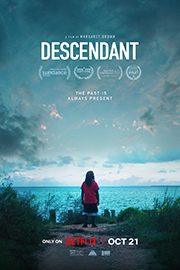 Descendant is a documentary about Africatown, a small Black community in Alabama many of whose members descended from enslaved people who were illegally brought to the area by the last slave ship to arrive in the United States, the Clotilda. The community is the subject of Zora Neale Hurston’s Barracoon, and the film brings together a variety of issues ranging from slavery to historical tourism to marine archeology to environmental racism to reparations.
Descendant is a documentary about Africatown, a small Black community in Alabama many of whose members descended from enslaved people who were illegally brought to the area by the last slave ship to arrive in the United States, the Clotilda. The community is the subject of Zora Neale Hurston’s Barracoon, and the film brings together a variety of issues ranging from slavery to historical tourism to marine archeology to environmental racism to reparations.
Descendant documents connections between plantation slavery and continuing racial and environmental inequality. Land near Africatown remains in the hands of many of the same families who enslaved the ancestors of the town’s residents. Surrounded by chemical plants and exposed to environmental poisons, community members have struggled with health-related consequences of structural racism which, the film shows, date back to slavery and the slave trade. The search for the Clotilda engaged the energies of many people: journalists, staff at National Geographic, marine archeologists, tourist promoters in Mobile, and the filmmakers themselves. The residents of Africatown, though, are at the center of this film. What would it look like for a community rich in history but otherwise impoverished to tell its own story? How might it be possible to do so? What will happen if it does? Ultimately the film asks about the nature of historical knowledge and how that knowledge may be converted into energy to create change.
Click here to view a trailer for Descendant.
 Margaret Brown | Director, Producer & Co-Writer
Margaret Brown | Director, Producer & Co-Writer
Margaret Brown’s documentary work examines the American South, from a seminal film on Townes Van Zandt “Be Here to Love Me,” to the impactful story of the BP oil spill’s lasting impact The Great Invisible, which won the Grand Jury Prize at SXSW a few years ago. Her film The Order of Myths, which examined Brown’s native Mobile, Alabama and its still segregated Mardi Gras celebration, won numerous awards including a Peabody and the Truer Than Fiction Independent Spirit Award. She’s also done short form work for the New York Times and Field of Vision, and recently directed an episode of Dirty Money for Netflix.
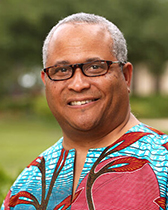 Dr. Kern Jackson | Co-Producer and Co-Writer
Dr. Kern Jackson | Co-Producer and Co-Writer
Kern Michael Jackson, Ph.D., is a folklorist with an extensive academic career in ethnography, oral history, material culture, and literary folkloristics. He is currently the director of the African American Studies program at the University of South Alabama. Previously, he was curator of minority history for The Museum of Mobile, Alabama, and the project coordinator for the City of Mobile’s Tri-centennial Celebration Video Oral History Project. He taught for two years in the District of Columbia Public School System. Dr. Jackson served as a historian on the documentary The Order of Myths, directed by Margaret Brown. He has appeared in multiple episodes of an Alabama Public Television Series, Alabama Journey Proud. In 2020, he was part of Alabama Black Belt Blues, a documentary about Alabama’s blues music tradition, centered in its fertile Black Belt region. Dr. Jackson is a graduate of the University of Virginia, with a degree in English Literature and African-American Studies. He has a master’s degree from University of Wisconsin-Madison in African-American Studies and holds a doctorate in Folklore from Indiana University Bloomington.
Close Encounters of the Colonial Kind
Professor Kim Tallbear
Co-presentend by the Science in Human Culture Program as part of their Klopsteg Lecture Series.
May 22, 2023
5:00 -6:30 pm
Harris Hall #108
Much of this talk is written in the voice of IZ, a character Kim TallBear introduced in the 2016 chapter, “Dear Indigenous Studies, It’s Not Me, It’s You: Why I Left and What Needs to Change.” IZ represents the evolving field that began as American Indian or Native American studies in the United States in the later twentieth century. Today, a later disciplinary iteration, Critical Indigenous Studies, represents a coming together of multiple “Indigenous self determination and sovereignty political movements” around the world, as described by Aileen Moreton-Robinson, wherein “Indigenous scholars began to define the terms of their intellectual engagement within universities” (2016: 7). The IZ whom TallBear spoke to in the 2016 essay, and from whose collective body she performs this talk, has grown into a twenty-first-century expanding discipline. As Moreton-Robinson writes, our “object of study is colonizing power in its multiple forms, whether the gaze is on Indigenous issues or on Western knowledge production” (2016: 4) In this talk, TallBear's object of study and critical polydisciplinamorous engagement is a scientist character who searches for signs of “intelligent” life off-Earth.
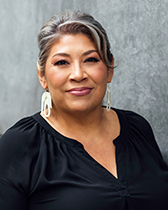 Kim TallBear (Sisseton-Wahpeton Oyate) (she/her) is Professor and Canada Research Chair in Indigenous Peoples, Technoscience, and Society, Faculty of Native Studies, University of Alberta. She is the author of Native American DNA: Tribal Belonging and the False Promise of Genetic Science. In addition to studying genome science disruptions to Indigenous self-definitions, Dr. TallBear studies colonial disruptions to Indigenous sexual relations. She is a regular panelist on the weekly podcast, Media Indigena. You can follow her research group at https://indigenoussts.com/. She tweets @KimTallBear. You can also follow her monthly posts on her Substack newsletter, Unsettle: Indigenous affairs, cultural politics & (de)colonization.
Kim TallBear (Sisseton-Wahpeton Oyate) (she/her) is Professor and Canada Research Chair in Indigenous Peoples, Technoscience, and Society, Faculty of Native Studies, University of Alberta. She is the author of Native American DNA: Tribal Belonging and the False Promise of Genetic Science. In addition to studying genome science disruptions to Indigenous self-definitions, Dr. TallBear studies colonial disruptions to Indigenous sexual relations. She is a regular panelist on the weekly podcast, Media Indigena. You can follow her research group at https://indigenoussts.com/. She tweets @KimTallBear. You can also follow her monthly posts on her Substack newsletter, Unsettle: Indigenous affairs, cultural politics & (de)colonization.
